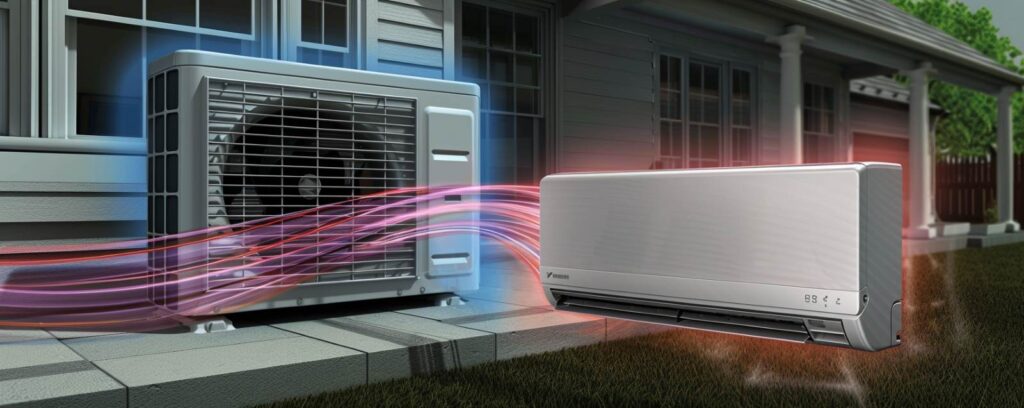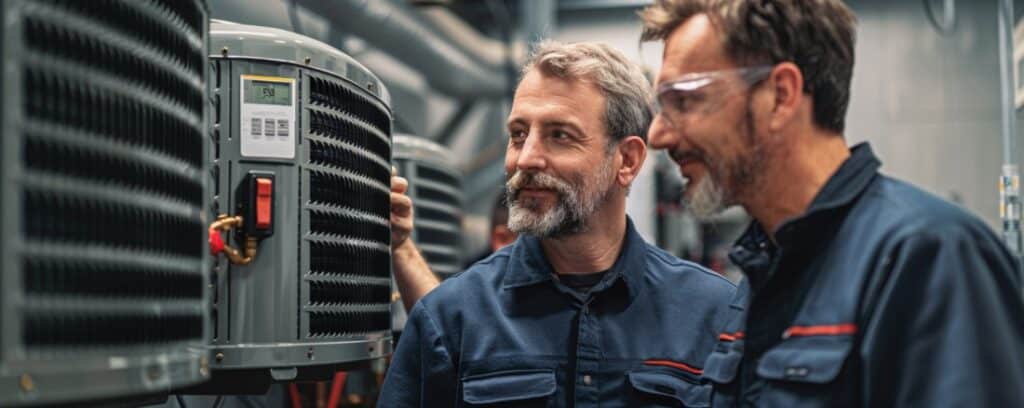Whether it’s maintaining comfortable home environments or ensuring efficient energy use in commercial buildings, the heating, ventilation, and air conditioning (HVAC) industry continues to thrive as an integral part of modern living in 2024.
For those contemplating a career path in the skilled trades, the question arises: Is HVAC a good career choice today?
Individuals interested in the field should explore the various facets of HVAC careers, examining the nature of the work, the opportunities it presents, and the steps required to embark on this fulfilling professional journey.
What Is HVAC?
HVAC, an acronym for heating, ventilation, and air conditioning, is the technology primarily responsible for maintaining comfortable indoor temperatures and air quality.
This field goes beyond just heating and cooling systems; it encompasses the comprehensive control of the indoor climate and air quality in both residential and commercial settings.
Heating Systems
Heating systems, a crucial component of HVAC, involve the generation and distribution of heat through various means, such as furnaces, boilers, and heat pumps.
These systems are essential for maintaining warmth, particularly in regions with cold climates.
Ventilation Systems
Ventilation systems ensure that indoor air quality is maintained to healthy standards.
It involves the replacement or exchange of air within a space to control temperature; replenish oxygen; remove moisture, odors, smoke, heat, dust, airborne bacteria, and carbon dioxide; and circulate air.
Air Conditioning
Air conditioning systems cool and dehumidify indoor air, providing comfort in warmer climates.
These systems range from small units suitable for single rooms to large systems designed for entire buildings.
Importance in Today’s World
In the current era, HVAC systems play an important role. They are essential in residential buildings for comfort, in hospitals for health and safety, and in industrial buildings for operational efficiency.
Moreover, with the advent of smart home technology and the increasing focus on energy efficiency, HVAC systems are continually evolving to be more effective, sustainable, and integrated with other smart home technologies.
Technological Advancements
Recent years have witnessed significant advancements in HVAC technology. From smart thermostats that allow remote control and monitoring to environmentally friendly refrigerants and energy-efficient designs, the industry is at the forefront of innovation.
These advancements not only improve efficiency but also contribute to environmental sustainability, making the HVAC field an exciting area for those interested in technology and environmental stewardship.
The HVAC industry represents a fusion of comfort, innovation, and sustainability. It’s a field that not only addresses the immediate needs of temperature control and air quality but also looks forward to the future of technological integration and environmental responsibility.
As such, considering a career in HVAC means being at the crossroads of a rapidly evolving and socially significant industry.
What Are the Careers in the HVAC Field?
The HVAC industry offers a variety of career paths, each with its unique responsibilities and specialties. Here’s a look at some of the key roles in this field:
1. HVAC Technician
An HVAC technician is at the frontline, installing, maintaining, and repairing HVAC systems. They work on a variety of equipment including air conditioners, heating units, and refrigeration systems.
Technicians often travel to different locations, providing services in both residential and commercial settings.
2. HVAC Engineer
HVAC engineers are involved in the design and development of HVAC systems. They work on creating efficient, sustainable systems and may also be involved in research and the integration of new technologies.
This role often requires a higher degree of education, such as a bachelor’s or master’s degree in mechanical engineering or a related field.
3. HVAC Installer
Specializing in the installation of HVAC systems, HVAC installers are critical in ensuring that systems are set up correctly and efficiently.
They work closely with technicians and engineers to understand the specific requirements of each system.
4. Sales Consultant and Customer Service
These professionals are key to the business side of HVAC. Sales consultants advise customers on the best HVAC solutions for their needs, while customer service representatives handle queries and help resolve issues, ensuring a positive customer experience.
5. HVAC Project Manager
An HVAC project manager oversees larger-scale HVAC installation and maintenance projects. They ensure projects are completed on time, within budget, and to the required standards.
This role requires strong organizational and leadership skills.
6. Air Quality Control Specialist
As concerns about indoor air quality rise, the role of air quality control specialists becomes more important.
These professionals focus on ensuring that HVAC systems effectively remove contaminants and maintain healthy air standards.
Is HVAC a Good Career to Pursue?
When considering an HVAC career, several factors highlight its attractiveness as a career choice:
Job Stability and Demand
The HVAC industry has shown resilience and steady growth over the years. With climate change leading to more extreme weather conditions, the demand for skilled HVAC professionals is expected to remain strong.
Heating and cooling are essential needs, ensuring a constant need for installation, maintenance, and repair.
Benefits of a Career in HVAC
- Diverse Opportunities: The HVAC field offers a wide range of career paths, from hands-on technical roles to design, management, and sales.
- Advancement Potential: There are ample opportunities for professional growth. With experience and additional certifications, one can move into higher-paying positions and specialized roles.
- Job Satisfaction: Many professionals in the HVAC field find great satisfaction in their work, stemming from the problem-solving nature of the job, the variety of daily tasks, and the direct impact on improving people’s lives.
Educational Pathways
A career in HVAC doesn’t necessarily require a four-year degree. Many enter the field through vocational training or apprenticeships.
These programs often combine classroom learning with hands-on experience, preparing candidates for immediate entry into the field.
Technological Advancements
The HVAC industry is at the forefront of adopting new technologies, offering professionals the chance to work with cutting-edge systems.
This includes smart home technology, renewable energy integration, and green building practices, appealing to those with an interest in technology and sustainability.
Making a Difference
HVAC professionals play a crucial role in ensuring comfort, safety, and energy efficiency. Their work directly impacts the environment and people’s daily lives, offering a sense of purpose and accomplishment.
A career in HVAC offers stability, a variety of paths, growth potential, and the opportunity to work with evolving technologies and make a meaningful impact.
Whether one’s interests lie in hands-on technical work, design, sales, or management, the HVAC industry presents a compelling and rewarding career choice.
How to Become an HVAC Professional
Pursuing a career in the HVAC industry involves a combination of education, hands-on training, and obtaining necessary certifications.
Here’s a step-by-step guide to becoming an HVAC professional:
Educational Requirements
- High School Diploma or GED: This is the basic educational requirement for most HVAC training programs.
- Vocational Training: Many choose to attend a vocational or trade school to learn the fundamentals of HVAC systems. These programs typically last from six months to two years.
Vocational and Technical Training
- Apprenticeship Programs: These combine classroom instruction with on-the-job training, typically lasting three to five years. Apprentices work under experienced professionals, gaining hands-on experience.
- Technical Colleges: Offer more comprehensive training, often including newer technologies and more advanced systems.
Steps to Enter the HVAC Industry
- Obtaining Necessary Certifications: Most states and employers require HVAC technicians to hold specific certifications, like the EPA Section 608 certification, which is mandatory for handling refrigerants.
- Hands-On Training and Apprenticeships: Essential for practical experience. Apprenticeships are highly valued as they provide both training and real-world experience.
- Specialization and Continuous Education: HVAC professionals can specialize in areas like commercial refrigeration, residential systems, or green energy systems. Ongoing education is crucial to keep up with technological advancements and industry standards.
Why Should You Become an HVAC Professional?
There are several compelling reasons to consider a career in the HVAC industry:
Personal and Professional Rewards
- Career Longevity and Security: The constant need for HVAC services renders this field relatively recession-proof, providing long-term job security.
- Satisfaction from Problem-Solving: HVAC work often involves diagnosing and fixing complex issues, offering a sense of accomplishment and intellectual stimulation.
Opportunities for Entrepreneurship
- Starting Your Own Business: With experience and a client base, many HVAC professionals start their own businesses, offering flexibility and potentially higher earnings.
- Freelance Opportunities: Skilled technicians can also work as freelancers or consultants, providing services directly to clients or businesses.
Global Demand for HVAC Professionals
- International Opportunities: HVAC skills are in demand worldwide, providing potential opportunities for international work and travel.
- Adapting to Global Trends: As global focus shifts towards energy efficiency and sustainable living, HVAC professionals are key players in implementing these changes.
Choosing an HVAC career not only offers a stable and rewarding professional pathway but also places one at the forefront of technological innovation and environmental stewardship.
With opportunities ranging from hands-on technical work to entrepreneurial ventures, HVAC stands out as a career that combines personal growth, job security, and the chance to make a significant impact on society and the environment.
Where Do HVAC Professionals Work?
HVAC professionals find employment in diverse settings, reflecting the industry’s wide reach:
Residential and Commercial Settings
- Homes and Apartments: Installing and maintaining systems in private residences.
- Businesses and Offices: Ensuring comfortable working environments in commercial buildings.
Specialized Environments
- Hospitals and Healthcare Facilities: Providing essential climate control for health and safety.
- Industrial Settings: Working on large-scale systems in manufacturing and other industries.
Self-Employment and Consulting
- Starting a Business: Many HVAC professionals eventually start their own business or consultancy.
- Freelance Opportunities: Providing services as a contractor for various clients.
Educational Institutions and Training Centers
- Teaching and Training: Experienced professionals often teach in vocational and technical schools.
- Research and Development: Contributing to innovation in academic or corporate research settings.
Each of these environments offers unique challenges and opportunities, making HVAC a diverse and dynamic field.
Whether you prefer hands-on technical work, customer interactions, or the business side of operations, there is a place for you in the HVAC industry.
HVAC Salary Overview
An HVAC career not only offers job satisfaction and a variety of opportunities but also presents a competitive salary landscape. Understanding the financial aspects of this career is important for those considering this path.
Average Salary
The salary for HVAC professionals varies, reflecting factors like experience, certifications, and geographic location.
As of May 2022, the median annual salary for HVAC mechanics and installers was $51,390, according to the U.S. Bureau of Labor Statistics (BLS). The lower 10% earned around $36,000 per year, while the top 10% earned approximately $83,000 annually.
Salary can also vary by state, with mean salaries averaging around $67,430 in California, $69,540 in New York, and $51,790 in Texas in 2022, influenced by factors like the cost of living and local demand for HVAC services.
HVAC Career Job Growth
The job outlook for HVAC mechanics and installers is positive, projected to grow by 6% from 2022 to 2032.
This growth is fueled by various factors, including the need for new installations, maintenance, and upgrades of existing systems, especially in light of the focus on energy efficiency and sustainability.
The demand for skilled HVAC technicians remains strong across the U.S., with additional opportunities for financial success for those pursuing further education and specializing in areas like eco-friendly HVAC systems.
HVAC Career FAQ
What Degree Do I Need to Become an HVAC Professional?
Most HVAC technicians have at least a high school diploma or GED, and many complete postsecondary education, such as an HVAC certificate or associate degree from a vocational school or community college.
These programs cover system design, troubleshooting, and safety protocols.
What Do HVAC Professionals Do?
HVAC technicians install, maintain, and repair heating, ventilation, air conditioning, and refrigeration systems.
They work in various settings, including homes, businesses, and industrial facilities, ensuring these systems operate efficiently and safely.
How Long Does It Take to Become an HVAC Professional?
Becoming an HVAC technician typically involves completing an educational program, which can last from six months to two years. Apprenticeships, offering hands-on experience, also last about three to five years.
How Much Do HVAC Professionals Make?
The median annual wage for HVAC professionals was $51,390 as of May 2022, according to the BLS.
Entry-level technicians earn lower wages, while experienced and specialized technicians can earn significantly more.
What Skills Do I Need to Be an HVAC Professional?
Essential skills include strong mechanical aptitude, proficiency in troubleshooting, and the ability to read blueprints and technical manuals.
Communication skills are crucial for client interaction and explaining technical issues.
Are There Internship Opportunities for HVAC Professionals?
Internship opportunities are available and often part of educational programs. Internships provide practical experience and can be crucial for networking and career development in the HVAC field.




